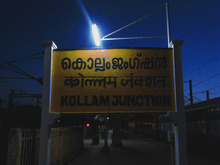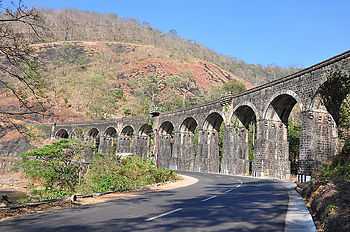Kollam–Sengottai branch line
| Kollam–Sengottai branch line | ||||||||||||||||||||||||||||||||||||||||||||||||||||||||||||||||||||||||||||||||||||||||||||||||||||||||||||||||||||||||||||||||||||||||||||||||||||||||||||||||||||
|---|---|---|---|---|---|---|---|---|---|---|---|---|---|---|---|---|---|---|---|---|---|---|---|---|---|---|---|---|---|---|---|---|---|---|---|---|---|---|---|---|---|---|---|---|---|---|---|---|---|---|---|---|---|---|---|---|---|---|---|---|---|---|---|---|---|---|---|---|---|---|---|---|---|---|---|---|---|---|---|---|---|---|---|---|---|---|---|---|---|---|---|---|---|---|---|---|---|---|---|---|---|---|---|---|---|---|---|---|---|---|---|---|---|---|---|---|---|---|---|---|---|---|---|---|---|---|---|---|---|---|---|---|---|---|---|---|---|---|---|---|---|---|---|---|---|---|---|---|---|---|---|---|---|---|---|---|---|---|---|---|---|---|---|---|
 Kollam Junction railway station at night | ||||||||||||||||||||||||||||||||||||||||||||||||||||||||||||||||||||||||||||||||||||||||||||||||||||||||||||||||||||||||||||||||||||||||||||||||||||||||||||||||||||
| Overview | ||||||||||||||||||||||||||||||||||||||||||||||||||||||||||||||||||||||||||||||||||||||||||||||||||||||||||||||||||||||||||||||||||||||||||||||||||||||||||||||||||||
| Type |
Regional rail Light rail | |||||||||||||||||||||||||||||||||||||||||||||||||||||||||||||||||||||||||||||||||||||||||||||||||||||||||||||||||||||||||||||||||||||||||||||||||||||||||||||||||||
| Status | Partly Operational | |||||||||||||||||||||||||||||||||||||||||||||||||||||||||||||||||||||||||||||||||||||||||||||||||||||||||||||||||||||||||||||||||||||||||||||||||||||||||||||||||||
| Locale |
Tamil Nadu Kerala | |||||||||||||||||||||||||||||||||||||||||||||||||||||||||||||||||||||||||||||||||||||||||||||||||||||||||||||||||||||||||||||||||||||||||||||||||||||||||||||||||||
| Termini |
Kollam Junction Sengottai | |||||||||||||||||||||||||||||||||||||||||||||||||||||||||||||||||||||||||||||||||||||||||||||||||||||||||||||||||||||||||||||||||||||||||||||||||||||||||||||||||||
| Stations | 17 | |||||||||||||||||||||||||||||||||||||||||||||||||||||||||||||||||||||||||||||||||||||||||||||||||||||||||||||||||||||||||||||||||||||||||||||||||||||||||||||||||||
| Services | 7 | |||||||||||||||||||||||||||||||||||||||||||||||||||||||||||||||||||||||||||||||||||||||||||||||||||||||||||||||||||||||||||||||||||||||||||||||||||||||||||||||||||
| Website |
www | |||||||||||||||||||||||||||||||||||||||||||||||||||||||||||||||||||||||||||||||||||||||||||||||||||||||||||||||||||||||||||||||||||||||||||||||||||||||||||||||||||
| Operation | ||||||||||||||||||||||||||||||||||||||||||||||||||||||||||||||||||||||||||||||||||||||||||||||||||||||||||||||||||||||||||||||||||||||||||||||||||||||||||||||||||||
| Opening | November 26, 1904 | |||||||||||||||||||||||||||||||||||||||||||||||||||||||||||||||||||||||||||||||||||||||||||||||||||||||||||||||||||||||||||||||||||||||||||||||||||||||||||||||||||
| Owner | Indian Railways | |||||||||||||||||||||||||||||||||||||||||||||||||||||||||||||||||||||||||||||||||||||||||||||||||||||||||||||||||||||||||||||||||||||||||||||||||||||||||||||||||||
| Operator(s) | Southern Railway zone | |||||||||||||||||||||||||||||||||||||||||||||||||||||||||||||||||||||||||||||||||||||||||||||||||||||||||||||||||||||||||||||||||||||||||||||||||||||||||||||||||||
| Depot(s) |
Kollam Ernakulam Golden Rock | |||||||||||||||||||||||||||||||||||||||||||||||||||||||||||||||||||||||||||||||||||||||||||||||||||||||||||||||||||||||||||||||||||||||||||||||||||||||||||||||||||
| Technical | ||||||||||||||||||||||||||||||||||||||||||||||||||||||||||||||||||||||||||||||||||||||||||||||||||||||||||||||||||||||||||||||||||||||||||||||||||||||||||||||||||||
| Line length | 88.7 km (55.1 mi) | |||||||||||||||||||||||||||||||||||||||||||||||||||||||||||||||||||||||||||||||||||||||||||||||||||||||||||||||||||||||||||||||||||||||||||||||||||||||||||||||||||
| No. of tracks | 1 | |||||||||||||||||||||||||||||||||||||||||||||||||||||||||||||||||||||||||||||||||||||||||||||||||||||||||||||||||||||||||||||||||||||||||||||||||||||||||||||||||||
| Track gauge | 1,676 mm (5 ft 6 in) (Kollam Junction – Punalur section) | |||||||||||||||||||||||||||||||||||||||||||||||||||||||||||||||||||||||||||||||||||||||||||||||||||||||||||||||||||||||||||||||||||||||||||||||||||||||||||||||||||
| Loading gauge | 4,725 mm × 3,660 mm (15 ft 6.0 in × 12 ft 0.1 in) (BG)[1] | |||||||||||||||||||||||||||||||||||||||||||||||||||||||||||||||||||||||||||||||||||||||||||||||||||||||||||||||||||||||||||||||||||||||||||||||||||||||||||||||||||
| Operating speed | 31 km/h (19 mph) | |||||||||||||||||||||||||||||||||||||||||||||||||||||||||||||||||||||||||||||||||||||||||||||||||||||||||||||||||||||||||||||||||||||||||||||||||||||||||||||||||||
| Route number | 63[2] | |||||||||||||||||||||||||||||||||||||||||||||||||||||||||||||||||||||||||||||||||||||||||||||||||||||||||||||||||||||||||||||||||||||||||||||||||||||||||||||||||||
| ||||||||||||||||||||||||||||||||||||||||||||||||||||||||||||||||||||||||||||||||||||||||||||||||||||||||||||||||||||||||||||||||||||||||||||||||||||||||||||||||||||
The Kollam–Sengottai branch line (formerly known as Quilon–Shencottah or Quilon–Chenkotta line) is a railway line in South India which connects Kollam Junction in Kerala state and Sengottai (also spelled Shenkottai, Chengottai, Chenkottai, Senkottai) in Tamil Nadu. The Quilon–Shencottah railway line was the first railway line in the erstwhile Travancore state and is more than a century old. The Kollam–Sengottai section is part of the Kollam–Chennai meter gauge rail route commissioned by the British in 1904. The line has been partially converted to broad gauge. Currently, the railway line is operational from Kollam Junction to Punalur.
History
| Railways in Kerala cities |
|---|
 |
The Kollam-Sengottai metre gauge line was conceived and implemented by Maharajah Uthram Thirunal of Travancore. The railway line was built jointly by South Indian Railway Company, Travancore State and the Madras Presidency. After a survey in 1888, work started in 1900 and was completed by 1902. The first goods train travelled on this route in 1902 while the first passenger train began its run in 1904. Meter gauge services were inaugurated on 1 July 1904 with the first passenger train flagged off from Kollam by Maharajah Moolam Thirunal of Travancore with a 21-gun salute. The railway line was constructed by the British in the foothills of the Western Ghats to transport forest products, spices and cashews from Kollam to Chennai, their southern headquarters.
About the route
The route was once a lifeline for the people of the southern districts of Kerala state and the Sengottai-Virudhunagar belt of Tamil Nadu. It served to create a strong link especially among the trading community of these areas in the two States. British tea estates and coffee plantations thrived on the labour of tribesman living in the Thenmala forests and workers from Tamil Nadu. The railway line contributed much to the development of a plantation economy in this area. The farmers of the Shencottah-Virudhunagar belt depended on the trains to market their produce in south Travancore. Huge quantities of vegetables, groceries and dairy products such as curd were brought into Kollam district from Tamil Nadu by trains that plied the route. The Palaruvi and Kazhuthurutti waterfalls and the Thenmala eco-tourism centre are on the fringes of this line, and the Courtallam waterfalls at the destination make this route popular with nature lovers.[3]
Notable Landmarks on the route

- 13 Kannara Bridge
The 13 Kannara bridge or 13 Arch Bridge (Pathimoonu kannara palam) is a 108–year–old bridge at Kazhathuruthi. The bridge consists of 13 arches and is a major landmark on the Kollam-Sengottai railway line as well as a testimony to the architectural abilities of the British. The bridge connects two hillocks and stands on thirteen granite pillars each almost a hundred feet tall. Sandwiched by the Kollam-Thirumangalam National Highway on one side and the River Kazhuthurutti on the other, the bridge is 102.72 metres (337.0 ft) long and 5.18 metres (17.0 ft) tall.
- Aryankavu-Puliyara (Kottavasal) tunnel
The Aryankavu tunnel links Aryankavu in Kerala with Bhagavathipuram in Tamil Nadu. The tunnel was completed in 1903 and is 680 metres (2,230 ft) long. On both sides of the tunnel, the conch shell symbol of the Travancore rulers has been imprinted.
Popular Meter Gauge Trains on the route
- Train No:6105/6106 (Earlier 105/106) Kollam-Chennai Egmore Mail
This train was introduced in 1904 after the completion of Quilon-Sengottai-Virudhunagar meter gauge line and was flagged off by then Maharaja of Travancore, Moolam Thirunal. The train was later renamed the Quilon-Madras mail. The train was extended to Trivandrum in 1918 after completion of the Quilon-Trivandrum meter gauge line. This train was one of the early meter gauge trains to have an air conditioned coach and First Class. The train was truncated at Quilon after Kollam -Trivandrum Central meter gauge track was converted to broad gauge in 1979. The train by through Madurai junction railway station from 1996 via Manamadurai Junction when Virudhunagar-Madurai line was converted to broad gauge. The train was discontinued in June 2000.
- Train No:6383/6384 Tirunelveli -Kollam Express
- Sengottai-Kollam passenger
This passenger train was the main means of transport among office workers and students along this route.
Broad Gauge Conversion
The Punalur-Sengottai section is part of the 325-km Kollam- Sengottai-Tenkasi- Tirunelveli- Thiruchendur gauge conversion project and part of the Tenkasi- Virudhunagar trunk route to Chennai. The gauge conversion of the Sengottai- Thiruchendur section has been completed and is open to traffic.
Kollam - Punalur section
The Kollam Junction -Punalur meter gauge railway line to broad gauge conversion works foundation stone was laid in 1998 at Punalur. Services on the Punalur-Kollam metre gauge section were withdrawn on May 1, 2007, to facilitate the gauge conversion work. The gauge conversion took almost 11 years to complete after the foundation stone was laid. The 44 km line was converted to broad gauge and inaugurated on May 10, 2010. Passenger train services connecting Punalur to Kollam, Madurai, Guruvayur, and Kanyakumari are currently operational in this route.[2]
Punalur - Sengottai section
To facilitate the gauge conversion work on the Punalur-Sengottai section, train services on the section were withdrawn in September 2010.The 49.2-km Punalur-Sengottai section gauge conversion works is in progress currently and expected to get completed by 2016.[4] Sections like Punalur-Edamon reach and Sengottai-Bhagavathipuram reach have been completed recently.
Stations

The Railway stations in Kollam Junction - Sengottai railway line are
- Kollam Junction
- Kilikollur
- Chandanathoppe
- Kundara
- Kundara East
- Ezhukone
- Kottarakara
- Kuri
- Auvaneeswarem
- Punalur
- Edaman
- Ottakkal
- Thenmala
- Kazhuthurutti Halt
- Edapalayam
- Aryankavu
- Bhagavathipuram
- Sengottai
See also
References
- ↑ J S Mundrey (2010). Railway Track Engineering (Fourth ed.). New Delhi: Tata McGraw Hill. p. 7. ISBN 978-0-07-068012-8. Retrieved 9 January 2014.
- ↑ 2.0 2.1 "Passenger Train time Table-2013 - Punalur-Kollam-Punalur" (PDF). Indian Railways. Southern Railway zone. p. 54. Retrieved 9 January 2014.
- ↑ Whistling adieu
- ↑ Punalur-Sengottai gauge conversion on track
| ||||||||||||||||||||||||||||||||||||||||||||||||||||||||||||||||||||||||||||||||||||||||||||
